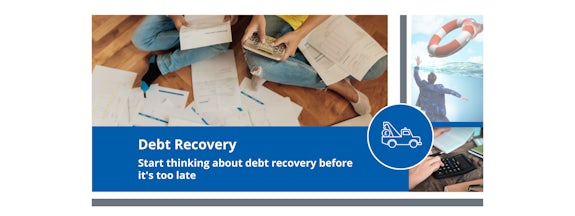
May 15, 2025

Scottish insolvency activity recently reached the highest level for a decade, according to the latest figures published by Accountant in Bankruptcy. 1,132 firms became insolvent in Scotland over the 12 months to March 2023, highlighting the real impact of the financial stresses and strains that many small businesses are facing.
Debt recovery goes almost hand-in-hand with insolvency, and we are beginning to see an uptick in activity as businesses across the board tighten their belts. For all firms, the ability to pay invoices – or indeed bills of any kind – and collect payments is becoming more challenging. Just as cash flow may be restricted for one company in debt, it can be much the same for those who provide credit and often it involves a chain of multiple businesses.
The UK has narrowly escaped a recession, but it remains a difficult economic environment for businesses. Many of the support initiatives launched during the pandemic are also beginning to wind down. The £77 billion drawn down through the UK Government’s Covid loan schemes must eventually be repaid, and we expect the debt recovery process to start ramping up in the coming months.
With this in mind, the best advice we can give is to start thinking about cash flow, credit control and debt recovery now, before it becomes too late. The directors of small businesses, in particular, cannot afford to bury their heads in the sand and it is important that they know the options available to them if their financial situation changes.
While there is undoubtedly an emotional attachment to running your own business, there is also a degree of personal liability that comes if you are found to be trading while insolvent. Many founders of Scottish SMEs will have signed a personal guarantee at some stage, likely thinking of it as paperwork in case of an emergency.
In reality, the legal process can kick in quite quickly for debt recovery and for sums much lower than you might expect. In some cases where goods have been supplied on credit and not paid, a limited company could be taken to court for as little as £750, and in as short order as 72 hours after the first demand. For cases against an individual, this extends to 21 days and £5,000 – which still leaves little breathing room.
Directors have duties to manage a business appropriately and the only real protection against any of the debt recovery process going sour is to seek professional guidance from a specialist legal team, accountant or insolvency practitioner. There may be options to go into a six-month moratorium, or it may be necessary to apply for personal bankruptcy, but continuing to run an insolvent business will only cause further problems.
In many cases, the first demand and the threat of legal action is enough to prompt action for companies in debt. But, unfortunately, some businesses may be unable to pay. For those firms, they need to be aware of the personal liability and speed at which the situation may change, seeking advice from the right people to try and resolve issues before it is too late.
It might seem like a daunting prospect, but pick up the phone and start the conversation before it gets to the point of litigation. SMEs are the lifeblood of the Scottish economy and it is important that we do what we can to help them survive.
If you would like to find out more please do not hesitate to contact our expert debt recovery team led by experienced partner David Alexander on 0131 516 5354 or by email: dalexander@gilsongray.co.uk.

David is a founding partner of the firm and heads up our award winning Debt Recovery Team which is ranked band 2 in the Legal500 for Debt Recovery in Scotland. He is recognised as a Leading Individual in the Legal500 and is well respected for his straight talking, no nonsense approach to litigation. His clients like his speed, his results driven approach and his clarity on costs.